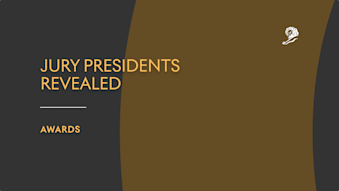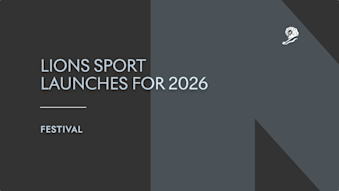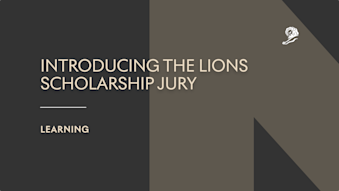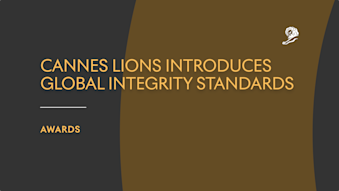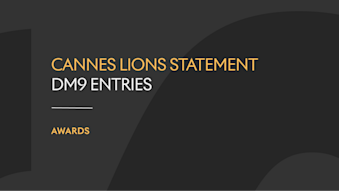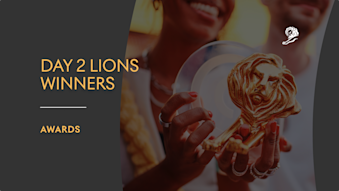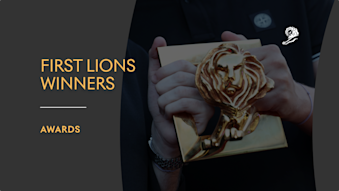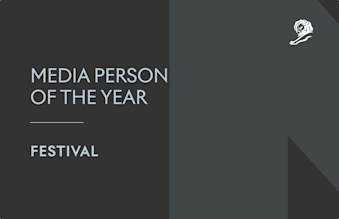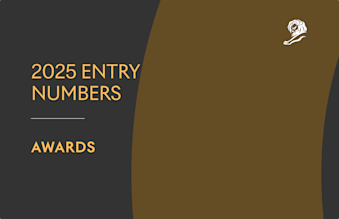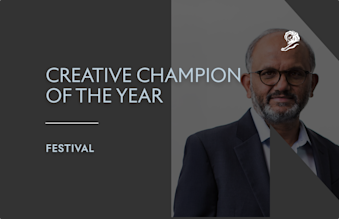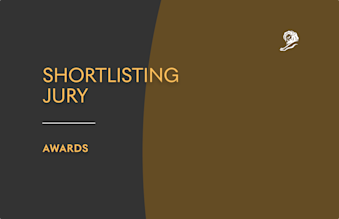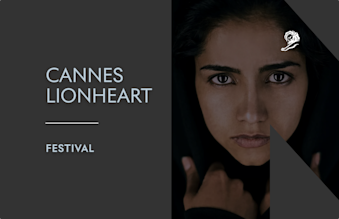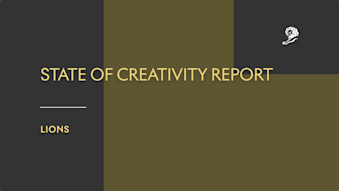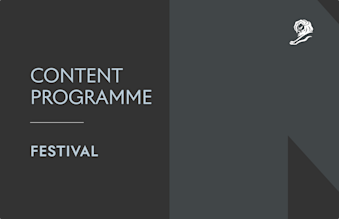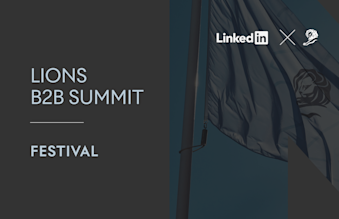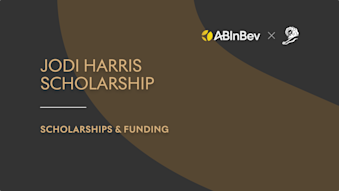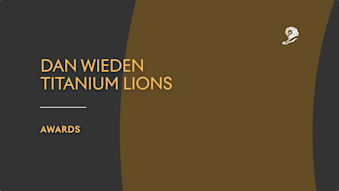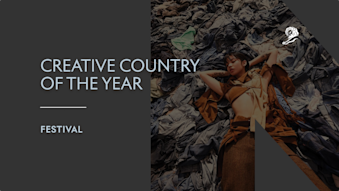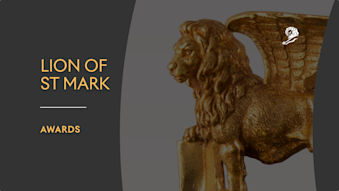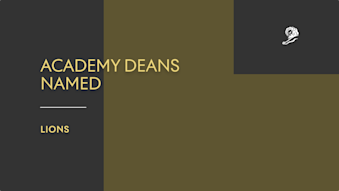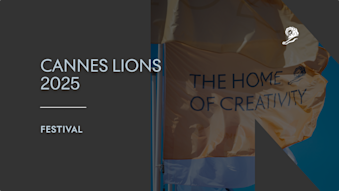News & Updates
2025 News
2024-2020 News
2024 SDG and Glass Lions donations announced
Donations are made to UNICEF, Dan Wieden’s Caldera, the Geena Davis Institute and Unstereotype Alliance.
2024 LIONS Creativity Report Rankings released
Highlights from the rankings include Coca-Cola taking Creative Brand of the Year for the first time, with its brands receiving 17 Lions.
Final Lion winners announced
The following Lions were awarded: Film, Glass: The Lion for Change, Sustainable Development Goals, The Grand Prix for Good and The Dan Wieden Titanium Lions.
2024 Young Lions winners announced
This year’s competition sees Kazakhstan and Uzbekistan being awarded for the first time
New report from The Geena Davis Institute released
‘The Power of Portrayal’ Report looks at representation in Cannes Lions Film and Film Craft Creative Work, from 2006 to 2023.
Lion winners announced on the penultimate day
The Brand Experience & Activation, Creative Business Transformation, Creative Commerce, Creative Effectiveness, Creative Strategy, Innovation and the new Luxury & Lifestyle Lions winners have been announced.
Further Lions winners announced on day three
The winners in the Creative B2B, Creative Data, Direct, Media, PR and Social & Influencer Lions were unveiled.
Cannes Lions announces the day two Lions winners
Winners across the Lions in the Entertainment and Craft Tracks were awarded.
First winners for 2024 announced
The Audio & Radio, Health & Wellness, Outdoor, Pharma, Print & Publishing Lions and the Lions Health and United Nations Foundation Grand Prix for Good winners have been announced.
Cannes Lions releases 2024 entry numbers
The Awards received a total of 26,753 submissions.
WPP confirm Elon Musk as this year’s guest speaker
The interview will cover the transformative power of technological innovation, how AI is reshaping creativity, business and society, and the future of X.
Young Lions official media partner announced
The News Movement journalists will bring the competitions to life through behind-the-scenes video content designed to capture the spirit of creativity and innovation that fuels the Festival.
Inaugural Luxury & Lifestyle Lions Jury announced
Jury President, Charles Georges-Picot, CEO Global Luxury Practice, Publicis Groupe will lead a multidisciplinary jury.
Ynon Kreiz named Entertainment Person of the Year
The award celebrates the creativity that inspires others to produce truly compelling, meaningful, and entertaining content.
Cannes Lions and timeTo launch Celebrating Safely
The partnership is designed to create and foster a supportive environment of respect, wellbeing, and accountability, around sexual harassment at industry events.
The 2024 LIONS Scholarship cohort announced
The scholarship offers 10 young creatives from around the world a fully-funded place on the Cannes Lions Brand Marketers and Creative Academies.
The Lion of St. Mark presented to Jacques Séguéla
France’s foremost advertising pioneer and former co-vice-chairman/chief creative officer at Havas will be honoured on stage in June
Unilever named 2024 Creative Marketer of the Year
The honorary accolade is presented to a marketer that has amassed a body of iconic, Lion-winning work over a sustained period of time, with Unilever establishing a reputation for producing brave, creative and innovative marketing solutions.
Maria Ressa honoured as 2024 Cannes LionHeart
The Nobel Peace Prize laureate and Co-Founder and CEO of Rappler is awarded in recognition of her efforts to safeguard freedom of expression
2024 Shortlisting Jury members announced
Industry experts from across 75 markets will shortlist world-class creative work this June.
Cannes Lions partners with The Black Network
Cannes Lions partners with The Black Network for a third year, to elevate Black Talent at the Festival
Cannes Lions unveils 2024 programme
The extensive content programme will showcase more than 150 hours of content, with around 500 speakers from across the spectrum of creativity.
2024 Awarding Jury members announced
Cannes Lions has today revealed the line-up of global experts selected to award the world's very best creative and effective work and benchmark excellence this June.
Cannes Lions launches LIONS Creators
This dedicated forum will include a curated mix of exclusive learning and networking experiences for creators and those working in the wider creator economy.
Cannes Lions announces 2024 See It Be It cohort
19 creatives, from 14 markets have been selected to take part in this unique learning and development programme
LIONS launches the Creative MBA (LIONS cMBA)
A new 10-week digital programme designed to accelerate the creative expertise and career progression of creatives and marketers.
LIONS releases annual State of Creativity
The seminal piece of research - and the biggest study of its kind - is an insight-led toolkit designed to enable senior marketers to quickly understand the creative landscape with functional advice on how to drive business growth using creativity.
Jury Presidents announced as Awards open
The names of 29 Jury Presidents, representing a record 15 markets have been announced for Cannes Lions 2024.
Applications open for Jodi Harris Scholarship
The Scholarship, in partnership with AB InBev, offers 10 emerging marketing leaders a fully-funded, curated programme.
2023 SDG Lions donations announced
Seven nonprofits have received donations through the Sustainable Development Goals Lions’ entry fees
Festival passes available
New initiatives and pass types will provide a balance of opportunities for everyone to attend the Festival in June.
Luxury & Lifestyle Lions launched
Lion introduced to provide a global benchmark for brands in the luxury space.
2023 LIONS Creativity Report released
Free to access, the annual LIONS Creativity Report has company rankings, trends and themes from the winning work and insights, analysis and interviews with Lions Jurors and Lion-winning creators.
Final Lion-winners announced
All winners announced at the final Awards show of the week at Cannes Lions.
Cannes Lions announces 2023 Young Lions winners
Australia, Canada, Dominican Republic, MENA, South Africa, South Korea and the United Kingdom win Gold.
Penultimate day winners announced
Saudi Arabia wins first-ever Grand Prix, Honduras and New Zealand win first Creative Strategy Lions
Further winners announced on day three
Argentina takes home the Creative Data Lions Grand Prix and Canada picks up the Grand Prix in the Direct Lions.
Entertainment Lions and Craft Lions Tracks winners
More Lions awarded in Tuesday's awards show: the Entertainment Lions and Craft Lions Tracks.
First winners announced at the Cannes Lions 2023
The winners of the Pharma, Health & Wellness, Outdoor, Print & Publishing and Radio & Audio Lions are announced.
Marketing Challenges whitepaper released
LIONS, WARC and The Effectiveness Partnership launched the results of a new global survey.
Cannes Lions releases 2023 entry numbers
26,992 entries are received, an increase of 6% from 2022
Entertainment Person of the Year Award announced
Cannes Lions has announced Kevin Hart - Entertainer, Entrepreneur and Founder & Chairman of Hartbeat, the global media company creating entertainment where comedy meets culture - as the 2023 Entertainment Person of the Year.
Experience a day of era-defining creativity
Enjoy a superb programme of industry titans and unique events lined up to celebrate 70 years of progress through creativity on 23 June.
Spike Lee is first Creative Maker of the Year
Visionary Academy Award® winning filmmaker Spike Lee is honoured with the Cannes Lion’s first Creative Maker of the Year award
New Marketing Scholarship Programme
The Jodi Harris Scholarship will offer emerging marketing leaders a fully-funded, curated programme at Cannes Lions.
Cannes Lions announces 2023 Shortlisting Jury
A line-up of global experts from across the creative industries will shortlist world-class creative work.
Cannes Lions announces 2023 See It Be It cohort
Cannes Lions has announced the participants chosen for the 2023 See It Be It female talent acceleration programme.
Championing the Sustainable Development Goals
The Sustainable Development Lions ask entrants to demonstrate how they contributed to or advanced the 2030 Agenda for Sustainable Development across people, planet, prosperity, peace and partnerships.
Lion of St. Mark award to Susan Hoffman
Lifetime achievement award for Susan Hoffman who has defined Wieden+Kennedy’s culture for 40 years, setting the bar for creative excellence and ground-breaking work.
Cannes Lions announces 2023 Awarding Jury members
This year’s Juries see the highest ever representation from Africa and the Middle East. Awarding Jurors represented from Bolivia, Egypt, Honduras, Jordan, Saudi Arabia, Ukraine and Zambia for the first time.
Yvon Chouinard honoured as 2023 Cannes LionHeart
Founder and former owner of Patagonia is awarded in recognition of his philanthropic contributions and commitment to environmentalism through his leadership of Patagonia.
Roger Hatchuel Academy 2023 students announced
37 students representing 29 different countries will make up this year’s class will attend this year’s Roger Hatchuel Student Academy at Cannes Lions International Festival of Creativity.
Get to know the Creative Effectiveness Lions
Creative effectiveness doesn’t just drive societal progression. It’s integral to business growth. Take a look at some work that embodies this ethos.
Cannes Lions announces first speakers
A lineup of world-class experts, challengers and disruptors from across the spectrum of creativity will take to the stage for the 70th edition of the Festival.
Black Out 2023
Joint partnership to create much-needed access for Black talent to the Cannes Lions Festival and associated industries.
AB InBev named 2023 Creative Marketer of the Year
The world’s largest brewer is awarded for a second consecutive year, the only brand to achieve this in the history of the Festival.
Black British Network & LIONS partnership ongoing
The Black British Network and LIONS, organisers of Cannes Lions, have confirmed a continuation of their partnership into its second year.
LIONS launches the LIONS Scholarship
LIONS will support more than 130 underrepresented members of the creative community and emerging talent with access to Cannes Lions
Kim Gehrig announced as Film Craft Jury President
Appointment completes the 2023 Jury President line-up.
Driving the effectiveness agenda at Cannes Lions
Creative Impact content stream launched to drive effectiveness agenda and uncover what it takes to build a business through creativity in 2023.
Cannes Lions opens for awards submissions
Cannes Lions has evolved its admissions process to focus on areas of Sustainability, Impact and Effectiveness, and DE&I.
Cannes Lions embeds sustainability across Lions
Sustainable Development Goals Lions 2022 entry fees of 226,860 euros are donated to five Lion-winning charities
Philip Thomas awarded IPA Honorary Fellowship
Philip Thomas, CEO, Ascential Intelligence & Events, Chairman, LIONS, has been awarded an IPA Honorary Fellowship in recognition of his outstanding contribution to the advertising industry over many years.
See It Be It applications open for 2023 programme
A total of 16 places are available for this year’s accelerator programme, in partnership with Verizon, which will take place at the Cannes Lions International Festival of Creativity between 19-23 June 2023.
Cannes Lions announces 2023 Jury President line-up
The names of the Jury Presidents have been announced. They will lead juries to award the Lions in this year's 70th edition of Cannes Lions.
Refreshing the Mobile Lions
We've refreshed the 2023 Cannes Lions Awards to truly celebrate work designed for mobile, portable devices and hand-held technology.
Refreshing the Media Lions
We've made some changes to the Media Lions, including a special focus on bold creativity from independent media agencies.
Pharma Lions revamped
The refreshed Pharma Lions now make a clear distinction between work covered under Pharma and work in Health & Wellness.
Get to know the Creative B2B Lions
Tweaked for 2023, take a look at what's new for the Creative B2B Lions.
Get to know the Entertainment Lion for Gaming
Start planning your entries and take inspiration from Lions-winning work.
New award: Entertainment Lions for Gaming
Cannes Lions has announced the launch of the Entertainment Lions for Gaming.
Cannes Lions pays tribute to Dan Wieden
The Titanium Lions, brainchild of Dan Wieden, is renamed the Dan Wieden Titanium Lions
Cannes Lions Official Wrap-Up Report 2022.
Everything you need to know to action the Festival’s key insights
The LIONS Creativity Report is released
The LIONS Creativity Report has been released today and is available to everyone for free...
Lessons from Cannes Lions: Sustainability at ...
Sustainable thinking must be fully integrated into the brand and agency model, and no longer additional.
The State of Creative Effectiveness
LIONS, WARC and The Effectiveness Partnership launched the results of a new survey in June...
WARC reveals insights from the 2022 Cannes...
Consumer participation, a step-change in brand purpose, tech partnerships and agile solutions for new...
Final Lion-winners announced at the 69th Cannes...
Film Lions, Glass: The Lion for Change, Sustainable Development Goals Lions and Titanium Lions
Cannes Lions announces Lion-winners on the ...
Cannes Lions announced the Lion-winners in the penultimate Awards Show of the Festival.
More Lion-winners announced on day three
Lion-winners are announced in: Brand Experience & Activation Lions, Creative Business Transformation...
Lions winners announced on day two
Entertainment Lions, Entertainment Lions For Music and Entertainment Lions for Sport, Industry Craft...
Winners announced on day one
Pharma Lions, Health & Wellness Lions, Lions Health and United Nations Foundation...
Cannes Lions Releases 2022 Entry Numbers
Early analysis shows brands realising the value of creativity as a lever for growth...
Cannes Lions First 2022 Shortlists Announced
Glass: The Lion for Change, Innovation Lions and Titanium Lions Shortlists announced ahead of the Festival...
Cannes Lions names two new Deans to head up its...
Two new Deans have been appointed to head up the Lions Academies and shape this important part of the...
Cannes Lions and ANA open up the CMO...
An expansion of the CMO Growth Council, five Global Growth Councils for Progress will tackle global issues...
Cannes Lions honours Malala Yousafzai
The girls’ education activist and Nobel Peace Prize laureate is given the award in recognition of her work to help all...
Cannes Lions announces shortlist jury
Cannes Lions has announced a line-up of global experts from across the creative industries...
A response from Simon Cook
We are committed to having more representative juries
Cannes Lions launches a Festival programme
2022 programme will focus on: Sustainability; DE&I; Talent; Data & Technology; Business...
Six Lion-winning charities to receive donations
A total of €271,488 will be distributed evenly to help charities continue their impact and work...
LIONS Academies Deans applications open
LIONS is looking for two Deans to run two of the academies at this year’s Cannes LIONS Festival in June 2022.
Cannes Lions Announces the 2022 See It Be It
The six female finalists join the 2020/21 cohort to take part in a bespoke accelerator programme...
Cannes Lions to present The Lion of St. Mark
Creative icon and industry trailblazer, Colleen DeCourcy, former President and Chief Creative Officer...
Cannes Lions honours AB InBev with...
Cannes Lions has announced that it will honour Anheuser-Busch InBev (AB InBev) as this year’s...
A focus on creative effectiveness
An opinion piece by LIONS VP, Awards & Insights & Susie Walker.
See It Be It announces applications
Five places are available for creative female talent to join the 2020/2021 cohort
Cannes Lions announces the 2022 Jury Presidents
Entries for the 2022 Lions open
Cannes Lions announces updates to the 2022 Awards
Cannes Lions has announced changes to the 2022 Awards...
Cannes Lions will return to Cannes
Reinvention, sustainability and digital access are key in the planning of the hybrid Festival
LIONS launches new initiative - The Brief
Calling on global creative community to use their collective talent for good
The first-ever LIONS Decoded
A one-day broadcast, LIONS Decoded will deconstruct the world’s highest ranking creative work with inspirational live and on demand content, insights and interviews.
Cannes Lions announces final winners of the week
Cannes Lions has announced the winners from the Film Lions...
Cannes Lions announces day four award winners
Brand Experience and Activation Lions, Creative Business Transformation Lions...
Cannes Lions announces award winners on day three
Digital Craft Lions, Industry Craft Lions, Film Craft Lions, Entertainment Lions for Sport, Entertainment...
Cannes Lions announces award winners on day two
Social & Influencer Lions, Media Lions, PR Lions, Direct Lions, Creative Strategy Lions and Creative Data Lions
Pharma, Health & Wellness, Outdoor...
The much anticipated Cannes Lions awards have kicked off today...
Creativity can change the world
ACT Responsible and the United Nations at Cannes Lions
Cannes Lions announces 2021 award entry numbers
Cannes Lions has published its entry numbers ahead of next week...
Cannes Lions Live Meet Ups, talks and live...
Virtual experiences, taking place through experiential platform, Spatial Web, will connect the community...
Call for bids to develop Lions' Diversity, Equi...
Lions are seeking bids from experienced and reputable partners to develop...
Cannes Lions Live 2021 launches full content...
The content agenda for Cannes Lions Live...
One Young World announced as main charity partner
Cannes Lions has announced that One Young World, the global forum...
Cannes Lions Live to livestream five awards...
Cannes Lions Live - taking place from 21-25 June 2021
Our diversity, equality & inclusion...
Following the discussion around DEI at Cannes Lions...
Cannes Lions awards Microsoft with...
Cannes Lions has announced that it will honour Microsoft as this year’s Creative Marketer...
Cannes Lions announces 2021 shortlist jury
Cannes Lions has today announced its jury line-up of global experts selected to shortlist world-class...
Cannes Lions announces 2021 jury members
Highest ever representation from global brands, platforms, entertainment ...
Cannes Lions 2021 to run as a fully digital exp...
LIONS has today announced that Cannes Lions 2021 will be fully digital...
The rise and rise of the new influencer
LIONS' managing director, Simon Cook, explores the new influencer in Raconteur's latest Future of Advertising report
LIONS publishes agenda for March edition of ...
Thought-leaders, authors and coaches join a roster of creative leaders to deliver an impactful learning experience
Cannes Lions Awards Presidents 2021
Cannes Lions has confirmed its Jury President line-up for the awards in June.
The all-new WARC Effectiveness Awards...
WARC has launched The WARC Effectiveness Awards in association with LIONS...
An Update from Cannes Lions
Cannes Lions has confirmed that the awarding of the Lions...
Cannes Lions 2021 Opens for Entries
The Cannes Lions Awards are now open.
The Future of LIONS Live
A Message from Simon Cook, Managing Director
Welcome to Day 5 of LIONS Live
We begin the final day of LIONS Live
Welcome to Day 4 of LIONS Live
We continue a packed week of original thinking...
Welcome to Day 1 of LIONS Live
LIONS Live starts today. Tune in to our daily livestream...
Cannes Lions launches LIONS Live
Cannes Lions today introduces Lions Live, a digital education, inspiration and networking...
Cannes Lions moved to 2021
The Festival and Awards will not take place in 2020
5 minutes with Ian Wharton
Ian Wharton currently sits as part of the creative leadership at AKQA and is the author of Spark for the Fire...
A Serious Conversation About Comedy
Teddy Lynn, Founder and Chief Creative Officer at Episode Four, is hosting a talk with his father at Cannes...
Talking creativity with the Lion of St Mark win...
We recently announced that Jeff Goodby and Rich Silverstein, founders of Goodby Silverstein...
What's new for Cannes Lions 2020/2021
Cannes Lions has always been developed in partnership with the creative communications community.

Partnerships tap into a client’s strategy and key objectives in order to craft world class, year round strategic concepts and programmes that deliver on the defined objectives, whilst aligning purposefully to the LIONS brand.
Take a look at our commercial partnership opportunities.

